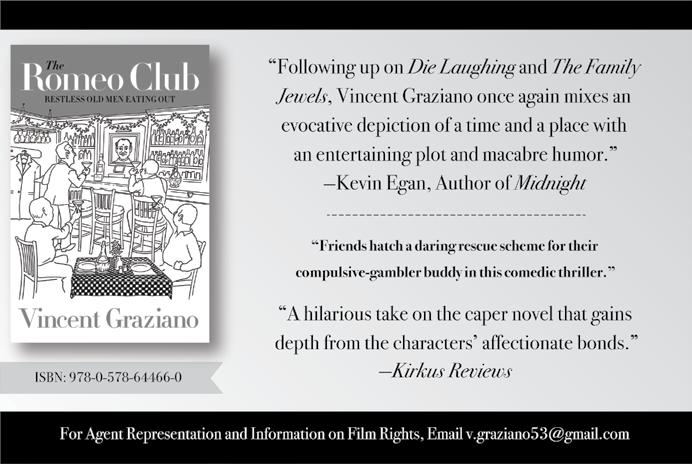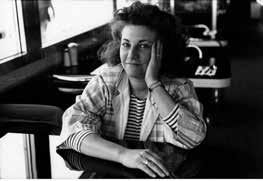
7 minute read
THE COMMUNE by Erica Abeel
fiction
These titles earned the Kirkus Star:
THE COMMUNE by Erica Abeel .......................................................... 4 A PASSAGE NORTH by Anuk Arudpragasam.....................................7 FIERCE LITTLE THING by Miranda BeverlyWhittemore................ 9 THE PASSENGER by Ulrich Alexander Boschwitz...........................10 RAZORBLADE TEARS by S.A. Cosby................................................17 GOLDEN GIRL by Elin Hilderbrand..................................................24
THE LOVE SONGS OF W.E.B. DU BOIS by Honorée Fanonne Jeffers................................................................. 26 THE LUMINOUS NOVEL by Mario Levrero; trans. by Annie McDermott................................................................ 28 THE BACHELOR by Andrew Palmer..................................................31 UNTHINKABLE by Brad Parks ...........................................................32 A PLACE LIKE HOME by Rosamunde Pilcher....................................32 NEW TEETH by Simon Rich................................................................34 WAYWARD by Dana Spiotta..............................................................36 BOLLA by Pajtim Statovci; trans. by David Hackston......................36 THE SNAKE PIT by Mary Jane Ward.................................................38 AUNTIE POLDI AND THE LOST MADONNA by Mario Giordano..39 HOLD FAST THROUGH THE FIRE by K.B. Wagers..........................42
THE LOVE SONGS OF W.E.B. DU BOIS Jeffers, Honorée Fanonne Harper/HarperCollins (816 pp.) $28.99 | Jul. 27, 2021 978-0-06-294-293-7
THE COMMUNE
Abeel, Erica Adelaide Books (328 pp.) $22.30 paper | Jul. 4, 2021 978-1-954351-79-0
This sharp, shapely roman à clef visits a group of feminists, writers, and intellectual hangers-on living as summer housemates on Long Island’s East End while they plan what will become the historic Women’s Strike for Equality of
Aug. 26, 1970.
Abeel affectionately ribs the political maneuverings of the feminists and the self-serving machinations of the writers while more harshly critiquing the proto-Trumpian businessmen, but her novel is at heart a romantic satire marked by apt literary quotations, Dickensian character names, and multiple references to Jane Austen. Running the group house is Gilda Gladstone, the reigning force of the women’s movement (who resembles Betty Friedan). Gilda is middle-aged and homely but charismatic and sexually driven, politically committed to women’s rights but wary of radical feminists, especially lesbians. She’s also deeply jealous of Monica Fairley (a stand-in for Gloria Steinem), who never appears but haunts the novel as Gilda’s glamorous competitor for feminist leadership. Around Gilda swirl her followers, including Leora, a recently divorced mother and struggling writer who’s looking for a husband, preferably rich. Leora takes trenchant, metafictional notes for a future novel while deciding between a crude but rich former boyfriend, “the Polish Gatsby,” and a talented but poor journalist who works at Clive Monomark’s Gotham (aka New York magazine under Clay Felker). Most of the other characters are composites. The guessing game becomes addictive: Is beautiful photographer Edwina Scahill, who’s bisexual and yearning for children, Sally Mann or Annie Leibowitz? Radical highbrow JoBeth Mankiller isn’t quite Susan Sontag. “Well connected dilettante” author Peter Grosvenor must be George Plimpton; rich, organ-playing Sebastian Nye, who co-publishes The National Bugle with William Buckley, sounds like harpsichordist Buckley himself. More important, almost all of Abeel’s characters show complexity— foolish yet brilliant, silly yet sad, insecure yet capable. As they fall in and out of affairs, commit minor treacheries, admit insecurities, and discover love, the reader starts caring deeply.
A joyous literary romp with hidden depth.
THE STARTUP WIFE
Anam, Tahmima Scribner (304 pp.) $26.00 | Jul. 13, 2021 978-1-982156-18-3
A brilliant coder marries her high school crush and creates an app that accidentally turns him into the millennial messiah. After high school, Asha Ray blossomed. “I stepped into my brain like I was putting on a really great pair of sneakers for the first time....I cut my hair very short and got the first six digits of Pi tattooed on my left shoulder.” She’s working at a high-powered Cambridge AI lab when she attends the funeral of a high school teacher back on Long Island. There, she runs into the beautiful, long-lost Cyrus, who now creates alternative rituals based on all the spiritual traditions of the Earth. Two months later they are married, and she’s left her lab to found a startup with her new husband and his wealthy best friend, Jules. WAI (We Are Infinite), the app Asha writes, leverages Cyrus’ alternative-ritual concept into a social media platform. Though the lawyers they consult about incorporation suggest that the couple get a postnup, two years later Asha remains on cloud nine. “I’m going to write a marriage guide,” she thinks. “I’ll call it The Startup Wife: How To Succeed in Business and Marriage at the Same Time.” But as WAI scales the heights of venture capital and turns into an international obsession—users have shared 800,000 cat baptisms alone—with Cyrus as its face, any good feminist might predict a darker outcome for this story. Anam’s fourth novel is very good on all the tech and millennial accoutrements, with imaginary apps for everything from consensual sex to anal hygiene and no scene complete without a glass of raspberry shrub or rosemary water. Nits: The outcome is overly signaled; feminism plays an odd role somewhere between liberation ideology and buzzkill; the front end of the pandemic crashing into the back end of the book seems unnecessary.
A clever, often funny anti-romance novel set in the world of platforms, launches, engagements, and turmeric lattes.
FICTION | Laurie Muchnick
Revisiting Laurie Colwin
It’s been almost 30 years since Laurie Colwin died of a heart attack at 48, and her books are ripe for rediscovery. I’ve thought of her often during the past year, wondering what she would have made of the pandemic. She’s best remembered for her delectable food books, Home Cooking and More Home Cooking, which include such quarantine-friendly chapters as “Bread Baking Without Agony” and “Easy Cooking for Exhausted People.” (We can save “The Once and Future Dinner Party” for later.)
But her smart, witty fiction is also deeply concerned with food and domestic life in general; she loves to describe her characters’ living rooms and china patterns, what they wear and what they eat, the music they listen to and the books they read—her work Nancy Campton makes the case that objects shed light on their owners. As she wrote in a story called “The Lone Pilgrim”: “Oh, domesticity! The wonder of dinner plates and cream pitchers. You know your friends by their ornaments. You want everything. If Mrs. A. has her mama’s old jelly mold, you want one, too, and everything that goes with it—the family, the tradition, the years of having jelly molded in it.” (Colwin had a delightful fondness for exclamations: A story called “My Mistress” ends, “Oh, art! Oh, memory!”)
Colwin’s books have been divided between two publishers, Vintage and Harper Perennial, which are now doing an unusual joint repackaging of all ten of them. The program began in February with Happy All the Time— which has a new introduction by Katherine Heiny, whose recent novel, Early Morning Riser (Knopf, April 13), I highly recommend—and will continue until both volumes of Home Cooking appear on Oct. 12, with introductions by Ruth Reichl and Deb Perelman. Though her titles include Another Marvelous Thing and Family Happiness, Colwin’s characters are not, of course, happy all the time— the books would be pretty thin if they were. Their problems are always emotional, though, and never practical. How do they support themselves? They might run their family’s charitable art foundation or practice law; when Elizabeth Bax, the heroine of Shine On, Bright & Dangerous Object, is widowed at 27, she tells her brother-in-law, Patrick, that she doesn’t want his late brother’s inheritance, saying, “I have some money of my own, and I can work.” Nothing to worry about! Elizabeth and Patrick fall in love, and that’s a situation Colwin can dig her teeth into. (For some reason, Shine On isn’t part of the reissue, but the old edition is still available.)
Another Marvelous Thing (Vintage, June 8) is a novel in stories recounting an affair between Francis Clemens and Josephine “Billy” Delielle. It begins with “My Mistress,” told from Francis’ perspective: “My wife is precise, elegant, and well-dressed, but the sloppiness of my mistress knows few bounds.” Colwin excels at prickly women like Billy, who doesn’t care about her appearance or—perhaps alone among Colwin’s characters—her surroundings but does care about intelligence and personal chemistry.
There are love affairs and friendships, stiff new marriages and comfortable old ones. There are new babies but no teenagers—I wish Colwin had lived long enough to tackle teenagers! As I reread the books today, they seem to come from another world, and I don’t mean 1970s and ’80s New York—more like Jane Austen’s England. The people are all rich and White and seem to float through life on a cushion of privilege, with all the time in the world to attend to their emotional turmoil. Colwin ignores the traditional writing-school advice to show, not tell: She talks to her readers, describing her characters from the outside in. This would make her fiction perfect for the audiobook format, but only Happy All the Time is available. Maybe that could come next, Vintage and Harper?

Laurie Muchnick is the fiction editor.






